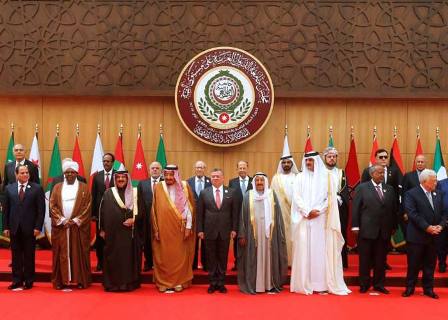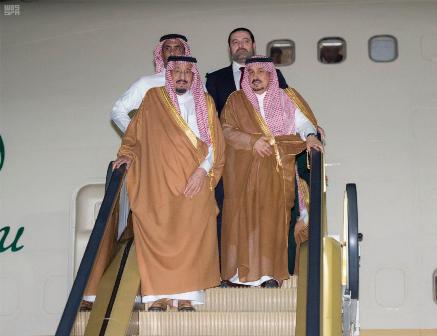Saudi Arabia is finding ways and means to consolidate the Arab world around the idea of deterring Iran. The latest summit of the League of Arab States showed that these efforts are so far useless. The Arab leaders again failed to reach a consensus on Iran. Calls for a coordinated response to Tehran’s actions “destabilizing” the Middle East were made at the Arab League Summit in Jordan on March 29. Addressing those present, Secretary General of the League Ahmed Aboul Gheit said, “Tehran provokes sectarianism and hinders efforts to resolve regional crises.” However, when it came to adoption of a final declaration, the Arab leaders against failed to reach a consensus.
Middle East media report that the draft final document of the summit contained rather soft criticism against Iran. Later, some Arab leaders insisted that much harsher statements were added to the preliminary text. Eventually, the Amman Declaration of the Arab League did not contain any direct condemnation of Iran for its “expansionism” in the Middle East.

Iran was just once mentioned in the text, specifically, the League once again demanded Iran to return the three “occupied” islands in the Gulf to UAE. It was the only issue the Arab leaders found a consensus on. In other parts, the declaration just indirectly refers to Iran emphasizing the need to support “the legitimate government in Yemen” and prevent any “interference into internal affairs” of the Arab states.
Quite uncertain statements were made also on Iraq and Syria – another two points of indirect confrontation of Saudi Arabia and its allies in the Gulf with Iran. Iraq’s government is not ready to vote for condemnation of “sectarian” (Sunnite-Shiite) clashes on the counterterrorist fronts in the West of Iraq. As for Syria, Iran and its “ground” groups were mentioned in the light of the need to liquidate “all terrorist groups” in the civil war-torn country. It is clear that Lebanese Hezbollah that was recognized as a terrorist organization by the Arab League and the Gulf Cooperation Council (GCC) could not be called as such in the Amman Declaration. The voice of the Lebanese government proved decisive here, and Beirut vetoed any reference to the “terrorist nature” of the Shia movement in Lebanon.
Meantime, Saudis still play on contradictions inside Lebanon. Arab authors spotlighted that Hezbollah’s outspoken rival and Saudi Arabia’s henchman in Lebanon, Prime Minister Saad al-Hariri, did not return to Beirut from Amman and was spotted flying with Saudi King Salman bin Abdulaziz Al Saud to Riyadh (1).

Consequently, the anti-Iranian trend of the Arab League summit failed despite great efforts by Saudis. A sudden visit by Foreign Minister of Saudi Arabia Adel Al-Jubeir to Baghdad on February 25, Riyadh’s other curtseys to Iraq’s Prime Minister Haider Al-Abadi and Lebanese President Michel Aoun, did not create a common stance of the Arab world on Iran. Haider Al-Abadi’s visit to Washington did not help either, though Iraq’s leadership hope for a “sincere talk” on Iran in the Oval Room.
As new U.S. Administration deems Iran as a “long-term threat” to security in the Middle East region, Saudi Arabia gets encouraged. Unlike his predecessor, Donald Trump has not yet bothered al-Saud family with hints that Riyadh may appear “tete-a-tete” against Tehran in case of a direct military conflict of the two regional powers.
Barack Obama gave Saudi Arabia enough reasons to cast doubt on his intention to observe the U.S.-Saudi agreements on security guarantees and mutual assistance. In this sense, Trump is more predictable for the Arab princes.
At the same time, lack of consensus on Iran inside the Arab world may fail the ongoing efforts to establish a wide regional coalition to “deter” Tehran. For Baghdad and Beirut possible confrontation of U.S. with Iran is an element of geopolitical power landscape they cannot but reckon with. After all, their financial and military dependence on U.S. and Saudi Arabia is too high. Therefore, these “hesitating” countries should realize the isolation they may face unless they stop protecting Iran on all Arab platforms.
Besides the efforts to involve the White House, Pentagon, generalship and Intelligence of U.S. into a long-term game against Iran, Arabs of the Gulf weigh solution of two important issues.
First, they weigh to remove discrepancies with Egypt over Syria that impede a consensus of the Arab states. Riyadh considers Egypt as the key element in its plans to create “Arab NATO” supported by U.S. and Israel. Without a strong Arab army, an efficient military alliance with an official goal to fight terrorism, but in fact, pursuing Iran’s “deterrence,” is simply impossible.
Saudis are trying to remove the note of mutual discontent that has been felt in the relations of Saudi Arabia and Egypt during the recent months. At the Arab League summit in Jordan, Saudi King Salman bin Abdul-Aziz al-Saud had a warm meeting with Egyptian President Abdel Fattah al-Sisi. The meeting resulted in restoration of supplies of oil and oil products from Saudi Arabia to Egypt, “unfreezing” of the credit line to Cairo, reanimation of bilateral multi-billion-worth contracts that were signed by the king while travelling to Egypt last April. As a sign of reconciliation, the king invited the Egyptian leader to visit Riyadh this month. The invitation was accepted. Afterwards, Egyptian Court lifted the block on transfer of Tiran and Sanafir islands in the Red Sea to Saudis.
The project with conditional name “Arab NATO” was discussed by politicians and experts during the visit by Crown Prince, Defense Minister of Saudi Arabia Mohammed bin Salman to Washington (March 13-17) and Egypt President al-Sisi (April 3). In both cases, the sides agreed upon the need to establish an Arab analogue of NATO to deter the growing influence of Iran in the region.
The idea of the Arab military alliance should be welcomed not only by the United States and its NATO allies, including Turkey, it needs to get Russia’s neutral, if not positive, attitude to it. Saudi diplomats and Israel’s military command and political leadership are now taking measures to that end. The task is to distance Russia and Iran from each other, including through silent consent of Moscow to the idea of “Arab NATO.”
Since the beginning of the year, UAR have been trying the role of the mediator between Russia and U.S. to find a common stance on a range of pressing issues in the Middle East. Saudis stay in the background, but their presence and interests are evident. The price of the deal is: lifting of sanctions against Russia, making “Crimea issue” obsolete, opening of Arabian credit and investment “locks” for Russia in exchange for Moscow’s final “rejecting” Iran.
That “generous proposal” – Iran is well informed of it and is taking counter-steps now – puts the Kremlin in quite a delicate situation. Temptation to accept the U.S.-Arab offers is high. United States and Saudi-Israeli momentary alliance actually test Russia for strategic principled stance. They hint that “Arab NATO” will be created sooner or later, but Russia can benefit from it right now.
Few countries would resist if they were on Russia’s place. A Big Power like Russia should not sacrifice its long-term interests for short-term benefits.
Nevertheless, Saudi Arabia keeps intriguing to impede rapprochement of Russia and Iran. Note that the issue of King Salman’s visit to Moscow that has been spoken of since summer of 2015 has come to the top again. Besides, Saudi Arabia is searching vulnerable points of the Russian-Iranian cooperation in Syria. For instance, recently pro-Saudi media has actively discussed the article by a former high-ranking Iranian diplomat who claimed that Tehran has no “exit strategy” from Syria, while Russia may give in to temptation and turn its back to Iran again (2).
So far, Saudis have to unite Arab countries against Iran, otherwise it will be impossible to establish their ambitious political and military alliance involving the countries of the Arab league and the GCC. Without achieving unity inside the Arab world, the “Arab NATO” is nothing but an abortive scheme.
(1) Mamoon Alabbasi, Wide gap between Arab leaders' official stands and facts on the ground // The Arab Weekly, April 2, 2017.
(2) Iranian diplomat: We have no exit strategy from Syria // Al Arabiya, March 31, 2017.
EADaily’s Middle East Bureau
 "Vladimir, stop!" — Trump is unhappy with Russia's massive strike on Kiev
"Vladimir, stop!" — Trump is unhappy with Russia's massive strike on Kiev "This, of course, is already for the doctor" — Zakharova about the statement of Ukraine's permanent Representative to the UN Melnyk
"This, of course, is already for the doctor" — Zakharova about the statement of Ukraine's permanent Representative to the UN Melnyk Humiliation of Poland, the big question of KAKA, Potter is transgender: morning coffee with EADaily
Humiliation of Poland, the big question of KAKA, Potter is transgender: morning coffee with EADaily An air alert has been declared throughout Ukraine
An air alert has been declared throughout Ukraine Trump's patience is running out: Zelensky is moving in the wrong direction — The White House
Trump's patience is running out: Zelensky is moving in the wrong direction — The White House Trump to announce withdrawal from negotiations on Ukraine in the coming days — "Legitimate"
Trump to announce withdrawal from negotiations on Ukraine in the coming days — "Legitimate"